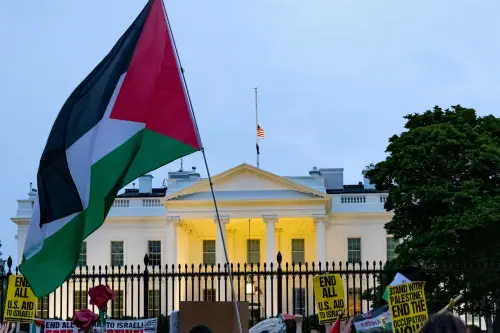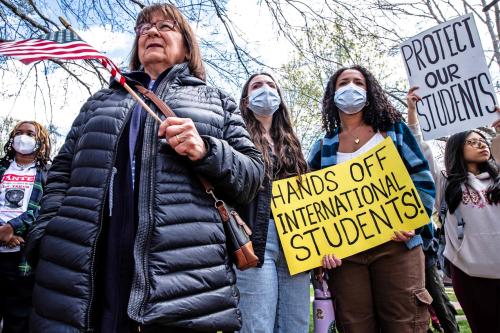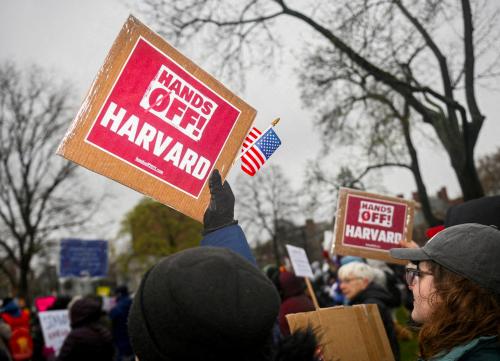Editor’s Note: Alice M. Rivlin gave a commencement speech before the graduating class at Indiana University. She urged the graduates to get involved in their communities and seek out compromise.
IU Grads of 2015, before I congratulate you on your achievements at IU and wish you the best of luck in the future, I want to give you a short but strong sales pitch. I want to urge you to muster your talent, energy, skills and common sense and pitch in wherever you are in the next few years on an urgent task that only you can do—fixing American Democracy so it works again.
I’m really worried that our precious American democracy is in danger. Public debate and discussion of important issues have become shouting matches with people, including presidential candidates, pointing fingers and blaming each other, rather than trying to solve problems. I’d like to use the very few minutes I have with you this morning to tell you why I am so worried and what I think you can do.
I have spent a long career in public life—a career that started right here in Bloomington in a freshman economics course I took at IU. In that course we talked about wages and prices and jobs and incomes—things that really matter to people’s lives. I got interested in how the economy works. What determines whether you can find a good job now that you have your IU degree, whether you can afford buy a house or a car, what a loan will cost, if you need one, how good the schools will be for your kids and whether your grandmother can get the health care she needs. Later I got interested in what policies can do to make people’s lives better, especially policies made by governments—local, county, state, and federal. I thought I’d like to try to help figure out how governments can make better decisions—decisions that help people live more rewarding lives. That’s sounds pretty ambitious, but I actually got to do it. I had a remarkably lucky series of opportunities to observe and participate in the policy-making process. Sometimes I was working with people who were studying an issue, collecting information, and trying to figure out what ought to be done—how colleges and universities should be paid for, for example, and what to do about student loan debt. Sometimes I was advising elected officials what to do and helping them do it—like how to balance the federal budget and how to fix the Social Security system, and big stuff like that and smaller stuff, too. I have worked with presidents, senators, members of congress, governors and mayors, central bankers, state legislators and city councils and citizens groups all over the country. It was always interesting and absorbing, sometimes exciting, sometimes disappointing, but usually a rewarding and satisfying thing to be doing. I ended up with a lot of respect for most of the people I worked with, including most elected officials. Most incredibly work hard and try to do the right thing. I was especially impressed with many people working trying to make things better at the local and neighborhood level.
It is really hard to make policy—any kind of policy. Hard to reach agreement on what to do. You already know that from working with all the groups you have been part of in your lives, including here at IU. In any group—sorority, dorm, club, sports team–people have different views, ideas, and experiences. Hardest problems involve conflicting values that same people hold. We all want more and better services and lower taxes. We all want less regulation and cleaner air and water. As you all have found out, the only way to solve problems, resolve differences is to sit down and talk, listen to each other, find common ground and agree on a course of action that most people think is fair. The final decision never makes everybody happy. Everyone has to give in a little to get anything done at all.
You know all that and you also know that the worst thing for getting problems solved is having someone in the group who thinks he or she knows all the answers, someone who won’t give an inch on anything, someone who refuses to listen to what others are saying or worried about. Even worse is to have someone who makes nasty personal remarks about people who disagree with him or her, who insults other people, bullies them, or makes them feel they don’t belong in the discussion. The only way to resolve any problem is to make sure that everyone gets a say, figure out where others are coming from and why they feel the way they do, and then propose compromise positions and discuss them until the group can hammer out something that works for most people. Sometimes it takes a long time. Solving problems—whether public or private–requires patience, trust, negotiation and willingness to compromise.
Compromise is not a sign of weakness. It is necessary to any problem solving process. The necessity of compromise is built into the America constitutional system under which we have operated for more than two centuries. We didn’t want a system where a powerful king or a small group could call all the shots and make all the rules. We fought a revolution against that sort of tyranny. So the founding fathers wrote a constitution that diffuses power and requires compromise to get anything done at all. It is an extraordinarily demanding system. Laws have to win separate approval of two legislative bodies with different types of representation of the voters. Those two bodies have to compromise with each other and then with the president, and in some cases get the approval of a majority of the Supreme Court.
Wow—what a lot of hurdles! Isn’t there a simpler way? Of course, there are lots of simpler ways—dictators get things done faster. So do parliamentary systems, where one party or coalition of parties wins the election and gets to make all the decisions until they lose an election. But our early leaders chose a complex system with separate power centers in the House and the Senate and an executive who must have concurrence of the legislature on almost everything, although they gave the president a veto and limited autonomy in foreign affairs. Our system protects minority views, but it slows things down, and compromise and, yes, deal-making is necessary to make it work at all.
For much of my time in public life, the policy-making process lurched forward with glacial speed, but did eventually address serious issues that Americans were worried about and take action on them. The process took forever, but we did get an Interstate Highway system, the Civil Rights Act in 1964, we passed Medicare and made it work pretty well for most seniors, we got tax reform in 1986, and welfare reform in 1996, we cleaned up air and water pollution. We managed to pass a federal budget and keep the government running reasonably well most of the time. All these legislative efforts took compromises and deals and a lot of time and hard work, but they did happen.
The last few years have been very different, especially in Washington.
The political parties have pulled apart. Center has disappeared. R’s and D’s don’t work together anymore to solve problems. Finger pointing, blaming, and exaggerating the differences have become normal. People with differing view don’t socialize or get to know each other or sometime even say, “Good morning.”
Compromise has become a dirty word. Praise is heaped on people for “sticking to principles,” meaning never trying to see the other side of the issue and try to find common ground. I am a Democrat, so I think the Republicans are more extreme, but both parties are guilty.
Result has been gridlock, lurching from crisis to crisis, creating doubt about whether the government will shut down, or the richest nation in the world will renege on its debts and obligations. Each party pretending that if they just stick to their principles and don’t give an inch they will sweep the election next time and have their way on everything. Not likely—our system of government doesn’t work that way. It requires compromise.
Meanwhile the gridlock means that we can’t move ahead on things almost everyone agrees need doing. We can’t fix our crumbling roads and bridges; can’t invest in the scientific research and skills we need to grow jobs for the future; can’t fix our broken immigration system; can’t agree on a sensible plan to reduce the growth of national debt, even though both parties recognize how important that is to a prosperous future.
So what can you do, IU grads of 2015? I believe you can make a huge difference wherever you are, if you will do two things.
- Get involved—don’t throw up your hands and say, “Older folks have made a mess and I don’t want to have anything to do with politics or policy.” You are right about the mess, but we need you to help fix it. Vote. Get engaged in making things better wherever you are—neighborhood, town, city, state. Make your views clear. Tell politicians you want them to solve problems, not enforce an ideology. Volunteer to help and then do it.
- Practice the art of bringing people together, finding common ground, crafting compromises that break out of gridlock. Seek out people who disagree with you, engage them in dialog, not mutual blaming; listen to what they think; invite them to listen to you; think about how to make it easier to talk calmly and brainstorm about solutions. Keep practicing the fine art of finding agreement. Find organizations that are trying to find solutions and help them do it.
Thanks for hearing me out. Congratulations and may good things happen to you as you leave Indiana University and move on to the next stage of your lives!
The Brookings Institution is committed to quality, independence, and impact.
We are supported by a diverse array of funders. In line with our values and policies, each Brookings publication represents the sole views of its author(s).



Commentary
IU Winter Commencement: “Only you can fix American democracy”
December 21, 2015